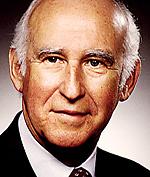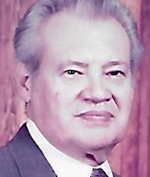The Story Behind the Awards
At the end of WW II there was a desperate need to deliver food and other critical supplies to the people of the Allied sectors of Berlin as a result of the Soviet blockade halting all land and water access to the city situated in the middle of East Germany. The massive effort — the Berlin Airlift — was implemented as a way to deliver food and other important supplies to Allied forces and local people through the only way possible – air cargo. For 13 months, an almost constant stream of aircraft landed, dropped off cargo, and departed again, eventually delivering more than 2 million tons of food. U.S. Air Force Major General William H. Tunner responsible for directing the Berlin Airlift tapped U.S. Air Force Colonel Edward Guilbert to be the traffic manager responsible for coordinating every movement of the essential supplies. In order to achieve the goals of the airlift Guilbert decided that the key was to transmit information about the cargoes ahead of the airplanes and that such information must be standardized so that everyone would know exactly what was being transported, in effect standard electronic manifests.
Ed carried this knowledge and experience with him into the 1960s and while working for the DuPont Company he developed a standard set of electronic messages for sending cargo information between DuPont and a carrier, Chemical Leaman Tank Lines.

By the mid-1960s Holland-America Steamship Line was sending trans-Atlantic shipping manifests as telex messages that were then converted into paper tape and input into the company’s computers. By 1968, so many railroads, airlines, truckers and ocean shipping companies were using electronic manifests that they formed the Transportation Data Coordinating Committee (TDCC) with the “purpose to create standards so that computers in different transportation companies and the industries they served can ‘talk’ to each other.” Ed was the president of TDCC for 19 years until his retirement and ultimately became recognized and known as the “Father of EDI.”
Prior to 1974-1975 there were many proprietary company-to-company and computer-to-computer standards in wide-spread use, each with their own and often conflicting definitions or specifications for the same elements. The TDCC achievement of developing and publishing in 1975 the first U.S. EDI integrated standards for air, ocean, motor and rail transportation was driven by the dedication, effort and motivation of not only Ed Guilbert, but also by three other individuals: Joe Carley, Ralph Notto and Earl “Buddy” Bass.
The work of developing standards grew out of review and analysis of documentation from the various transportation industry standards, including air, ocean, motor and rail. The development moved slowly at first and was based on the theory that common codes were needed and with them everything else would just fall into place. However, this “falling into place” did not happen. At this point it became evident that something else was essential in order to inter-relate these information elements. And most importantly, the goal of publishing the first TDCC EDI standards manual would not be achieved without additional expert help. It was at this point that Buddy Bass was brought into TDCC. Buddy brought with him a Master’s in Engineering Administration from George Washington University and the knowledge and expertise in how to create a comprehensive and efficient standards manual and his assignment was to ensure that this would be achieved.

As the principal author of the first set of EDI standards manuals based on input from transportation industry work groups Buddy designed the format and specified the content of those documents with a clear vision of continuous updates, enhancements, and refinements. His initial assignment was to ensure that what the TDCC work groups developed was presented in a comprehensive and understandable manual. That first publication, in July of 1975, created without assistance from computer automation and completed over three months, included forty-five transaction sets, sixty-eight segments, and 189 data elements.
These EDI standards are a set of rules and the definition of syntax making it possible to arrange and combine data elements into common standard format so that multiple industries can exchange business data efficiently. As a result of these common EDI standards companies in many industries can implement and maintain the standard formats efficiently as well as having the framework for controlling and enhancing them.
The work to create such a comprehensive and efficient standards manual resulted in terminology that is now the foundation of the U.S. EDI standards: transaction set, data segment, and data element. It was Buddy who proposed the term data element, such as quantity, date, time, name, etc., and to assign each data element a set of attributes or characteristics: data type, minimum and maximum length as well as an identifier and name. Buddy also enhanced the concept of “table driven” computer program logic used in the processing of EDI.
During the period from 1975 to 1984 TDCC continued developing the cross-industry standards and in 1977 the American National Standards Institute (ANSI) accredited the X12 standards with the Credit Research Foundation serving as its secretariat for a period of time. Ultimately, the Data Interchange Standards Association (DISA) was established to be the secretariat supporting the development of the X12 standards. Buddy Bass continued his relationship with the TDCC until 1984. Buddy served as the third chairperson of X12 and the first chairperson of the X12 Technical Assessment Committee. His influence on EDI standards, both in the U.S. and internationally, extended for over 20 years and he is widely recognized as an “EDI pioneer.”
Note: much of the detail and information about both Ed Guilbert and Buddy Bass were drawn from Ralph Notto’s book Challenge and Consequence… forcing change to eCommerce, published in 2005 by Fenestra Books.

